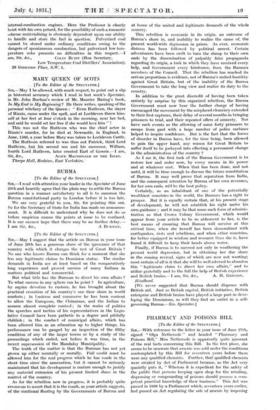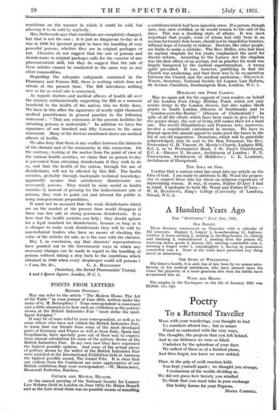PHARMACY AND POISONS BILL [To the Editor of the SPECTATOR.]
SIR,—With reference to the letter in your issue of June 27th, signed "Olga Nethersole " and headed "Pharmacy and Poisons Bill," Miss Nethersole is apparently quite ignorant of the real facts concerning this Bill. In the first place, she seems to be unaware that arsenic was sold under the conditions Contemplated by this Bill for seventeen years before there were any qualified chemists. Further, that qualified chemists were created by Act of Parliament because, as the Act very quaintly puts it, "Whereas it is expedient for the safety of the public that persons keeping open shop for the retailing, dispensing or compounding of poisons should possess a com- petent practical knowledge of their business." This Act was passed in 1868 by a Parliament which, seventeen years earlier, had passed an Act regulating the sale of arsenic by imposing
conditions on the manner in which it could be sold, but allowing it to be sold by anybody.
Miss Nethersole says that conditions are completely changed, but that is not the case ; it is just as dangerous to-day as it was in 1860 for ignorant people to have the handling of very powerful poisons, whether they are in original packages. or not. Chemists do not suggest that the sale of poisons and disinfectants in original packages calls for the exercise of any pharmaceutical skill, but they do suggest that the sale of these articles cannot be conducted in the same way as any other commodities.
Regarding the adequate safeguards contained in the Pharmacy and Poisons Bill, there is nothing which does not obtain at the present time. The Bill introduces nothing new so far as retail sale is concerned.
As regards doctOrs and medical officers of health all over the country enthusiastically supporting the Bill as a measure beneficial to the health of the nation, this we flatly deny.
We have in this office the signatures of nearly eight thousand medical practitioners in general practice to the following statement : "That any extension of the present facilities for obtaining poisons is undesirable." In addition we have the signatures of one hundred and fifty Coroners to the same statement. Many of the doctors mentioned above are medical officers of health.
We also deny that there is any conflict between the interests of the chemist and of the community in this connexion. On the contrary, looking at the matter from the point of view of the various health societies, we claim that no person to-day is prevented from obtaining disinfectants if they wish to do so, and that the health of the nation, through the use of disinfectants, will not be affected by this Bill. The health societies, probably through inadequate technical knowledge, apparently assume that satisfactory disinfectants are necessarily poisons. They would be more useful as health societies if, instead of pressing for the indiscriminate sale of poisons, they were to point out and interest the public in using non-poisonous preparations.
It must not be assumed that the weak disinfectants which are on the market at the present time would disappear if there was free sale in strong poisonous disinfectants. It is here that the health societies can help ; they should agitate for a legal standard for disinfectants, because so long as it is cheaper to make weak disinfectants they will be sold by non-technical traders who have no means of checking the value of the articles for sale, as is the case with the chemist.
May I, in conclusion, say that chemists' representatives have pointed out to the Government ways in which any necessary changes can be made in regard to the handling of poisons without taking a step back to the conditions which obtained in 1860 when every shopkeeper could sell poisons ?
(Secretary, the Retail Pharmacists' Union). 4 and 5 Queen Square, London, W.C. 1.











































 Previous page
Previous page